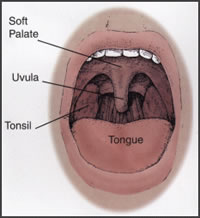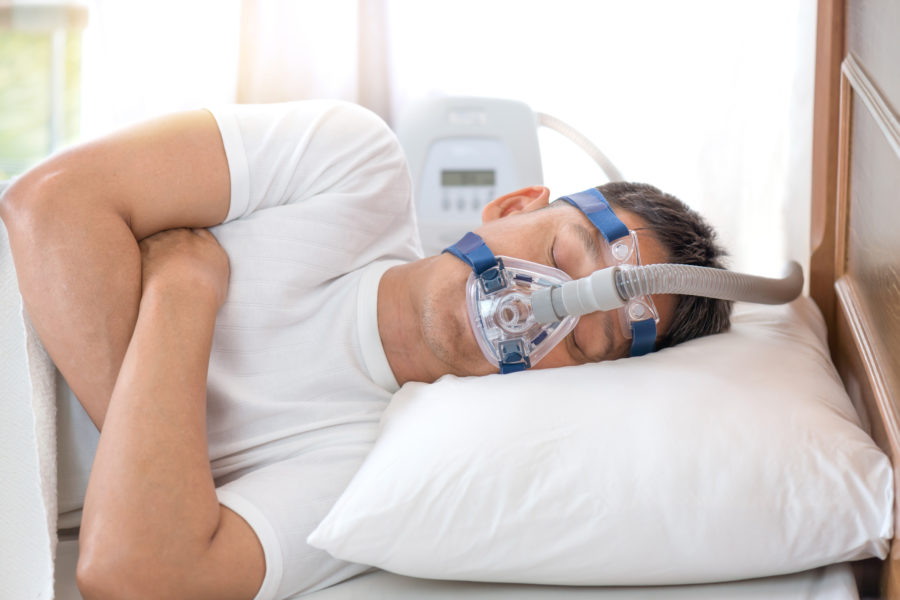Snoring and Sleeping Disorders

45% of normal adults snore at least occasionally, and 25% are habitual snorers. Problem snoring is more frequent in males and overweight persons, and it usually grows worse with age.
 More than 300 devices are registered in the U.S. Patent and Trademark Office as cures for snoring. Some are variations on the old idea of sewing a sock that holds a tennis ball on the pajama back to force the snorer to sleep on his side. (Snoring is often worse when a person sleeps on his back). Some devices reposition the lower jaw forward; some open nasal air passages; and a few others have been designed to condition a person not to snore by producing unpleasant stimuli when snoring occurs. But, if you snore, the truth is that it is not under your control whatsoever. If anti-snoring devices work, it is probably because they keep you awake.
More than 300 devices are registered in the U.S. Patent and Trademark Office as cures for snoring. Some are variations on the old idea of sewing a sock that holds a tennis ball on the pajama back to force the snorer to sleep on his side. (Snoring is often worse when a person sleeps on his back). Some devices reposition the lower jaw forward; some open nasal air passages; and a few others have been designed to condition a person not to snore by producing unpleasant stimuli when snoring occurs. But, if you snore, the truth is that it is not under your control whatsoever. If anti-snoring devices work, it is probably because they keep you awake.
What causes snoring?
The noisy sounds of snoring occur when there is an obstruction to the free flow of air through the passages at the back of the mouth and nose. This area is the collapsible part of the airway (see illustration) where the tongue and upper throat meet the soft palate and uvula. Snoring occurs when these structures strike each other and vibrate during breathing.
People who snore may suffer from:
- Poor muscle tone in the tongue and throat. When muscles are too relaxed, either from alcohol or drugs that cause sleepiness, the tongue falls backwards into the airway or the throat muscles draw in from the sides into the airway. This can also happen during deep sleep.
- Excessive bulkiness of throat tissue. Children with large tonsils and adenoids often snore. Overweight people have bulky neck tissue, too. Cysts or tumors can also cause bulk, but they are rare.
- Long soft palate and/or uvula. A long palate narrows the opening from the nose into the throat. As it dangles, it acts as a noisy flutter valve during relaxed breathing. A long uvula makes matters even worse.
- Obstructed nasal airways. A stuffy or blocked nose requires extra effort to pull air through it. This creates an exaggerated vacuum in the throat, and pulls together the floppy tissues of the throat, and snoring results. So, snoring often occurs only during the hay fever season or with a cold or sinus infection. A physical deformity of the nasal septum can also cause an obstruction.
Is snoring serious?
Socially, yes! It can be, when it makes the snorer an object of ridicule and causes others sleepless nights and resentfulness.
Medically, yes! It disturbs sleeping patterns and deprives the snorer of appropriate rest. When snoring is severe, it can cause serious, long-term health problems, including obstructive sleep apnea.
What is obstructive sleep apnea?
Obstructive sleep apnea is a reduction or cessation of breathing during sleep due to a blockage in the nose and/or throat. Serious episodes last more than ten seconds each and occur more than seven times per hour. Sleep apnea patients may experience 30 to 300 such events per night. These episodes can reduce blood oxygen levels, causing the heart to pump harder.
The immediate effect of sleep apnea is that the snorer must sleep lightly and keep his muscles tense in order to keep airflow to the lungs. Because the snorer does not get a good rest, he may experience morning headaches, feel tired all day, have problems with memory and concentration, etc. After many years with this disorder, one is more likely to develop other problems such as high blood pressure, diabetes, coronary artery disease and stroke.
How are snoring and sleep apnea evaluated?
Heavy snorers, those who snore in any position or are disruptive to the family, should seek medical advice to ensure that sleep apnea is not a problem. In addition to taking a health history and asking specific questions, Dr. Lieberman will do a physical examination to evaluate the air passages. Based on his findings, he may order a diagnostic overnight sleep study to measure and record breathing, heart rate, oxygen level etc. to see if sleep apnea is the issue.
How are snoring and sleep apnea treated?
Treatment depends on the diagnosis. Adults who suffer from mild or occasional snoring should try the following self-help remedies:

- Adopt a healthy and active lifestyle to develop good muscle tone and lose weight.
- Avoid tranquilizers, sleeping pills, and antihistamines before bedtime.
- Establish regular sleeping patterns
- Sleep on your side rather than your back.
- Tilt the head of your bed upwards four inches.
- Avoid alcohol for at least four hours and heavy meals or snacks for three hours before retiring.
For those adults who suffer from heavy snoring or sleep apea, DR. Lieberman might recommend:
- Uvulopalatopharyngoplasty (UVP3) surgery. This involves trimming flabby tissues in the throat and palate and expands air passages.
- Continuous positive airway pressure (CPAP). The patient wears a pressurized mask over the face while sleeping which pumps air through the airway to keep it open.
A chronically snoring child should be examined for problems with his or her tonsils and adenoids. A tonsillectomy and adenoidectomy may be required to return the child to full health.
Remember, snoring means obstructed breathing, and obstruction can be serious. It is not funny, and it is not hopeless.

